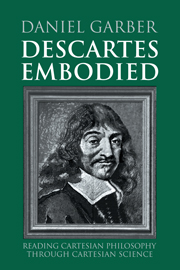Introduction
Published online by Cambridge University Press: 10 November 2009
Summary
My interest in Descartes was originally piqued when, as a graduate student, I had to assist in an introduction to philosophy. The Descartes I was asked to teach the students didn't make much sense to me; I couldn't figure out his point of view, why he was asking the kinds of questions he was asking, and why he was giving the kinds of answers he was giving. Something about his larger intellectual context seemed to be missing. But even then I knew that Descartes was deeply involved in the physical sciences of his day, and even without knowing exactly what Cartesian science meant, I had a deep suspicion that it was somehow connected with the philosophical writings I was teaching my undergraduates, the Meditations and the Discourse on the Method. At the time I was also very interested in the latest currents in contemporary philosophy, particularly the philosophy of Quine. Quine's enormously influential “Epistemology Naturalized” had just appeared, and everyone was talking about a more general naturalization of philosophy and the intimate connection between philosophy and the sciences. That gave me all the more reason to turn to Descartes and his contemporaries, who, in a sense, took it for granted that there was a continuum between what we call philosophy and what we consider the sciences.
And so I undertook a serious study of Descartes' science, as well as that of his contemporaries. This led me to a number of interesting observations. I came to see that Descartes' thought must be understood in the context of the attempt to reject Aristotelian physics, and replace it with a different kind of physics, one grounded in a mechanistic conception of nature.
- Type
- Chapter
- Information
- Descartes EmbodiedReading Cartesian Philosophy through Cartesian Science, pp. 1 - 10Publisher: Cambridge University PressPrint publication year: 2000
- 4
- Cited by



